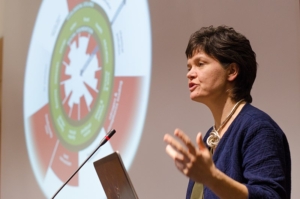

Marieke van Doorninck, the deputy mayor for sustainability and urban planning, says the pandemic added urgency that helped the city get behind a bold new strategy. Now, Amsterdam is grappling with what the doughnut would look like on the ground. The theory has won Raworth some high-profile fans in November, Pope Francis endorsed her “fresh thinking,” while celebrated British naturalist Sir David Attenborough dedicated a chapter to the doughnut in his latest book, A Life on Our Planet, calling it “our species’ compass for the journey” to a sustainable future. In the U.S., Portland, Ore., is preparing to roll out its own version of the doughnut, and Austin may be close behind. Copenhagen’s city council majority decided to follow Amsterdam’s example in June, as did the Brussels region and the small city of Dunedin, New Zealand, in September, and Nanaimo, British Columbia, in December. Raworth says DEAL has received an avalanche of requests from municipal leaders and others seeking to build more resilient societies in the aftermath of COVID-19. It’s the first time a major city has attempted to put doughnut theory into action on a local level, but Amsterdam is not alone. “Is it actually making us healthy and happy? What do we want? Is it really just economic growth?” “Now I think we’re one of the first cities in a while to start questioning this system,” Drouin says. In doing so, he paved the way for the creation of the first stock exchange-and the capitalist global economy that has transformed life on earth. In 1602, in a house on a narrow alley, a merchant began selling shares in the nascent Dutch East India Company.

By some accounts, that system, capitalism, has its origins just a mile from the grocery store. The so-called true-price initiative, operating in the store since late 2020, is one of dozens of schemes that Amsterdammers have introduced in recent months as they reassess the impact of the existing economic system. “There are all these extra costs to our daily life that normally no one would pay for, or even be aware of,” she says. The label by the zucchini said they cost a little more than normal: 6¢ extra per kilo for their carbon footprint, 5¢ for the toll the farming takes on the land, and 4¢ to fairly pay workers. One evening in December, after a long day working from home, Jennifer Drouin, 30, headed out to buy groceries in central Amsterdam.


 0 kommentar(er)
0 kommentar(er)
